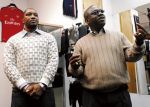PHILADELPHIA (NNPA)—When Islamic fascists piloted passenger jets into the Pentagon and the World Trade Center on Sept. 11, 2001, it was a moment that changed how many Americans perceived people of Middle Eastern ethnicity in general and Muslims in particular. Immediately there was a social backlash during which many American Muslims and Middle Eastern immigrants faced resentment where there had been none before.
 |
| SPEAKING OUT—Lansara Koroma, right, founder and executive director of the International Forum for the Rights of Black People with shop owner Ishmael Donzo.
|
After the attempted bombing of a passenger plane by Umar Farouk Abdulmutallab, a Nigerian national, the question arises again within the African immigrant community. According to the U.S. Justice Department, Abdulmutallab, 23, was charged in a federal criminal complaint with attempting to destroy Northwest Airlines passenger flight 253.
“The actions of Abdulmutallab are those of one man and are not representative of us,” said local businessman Lansara Koroma, a native of Sierra Leone.
“African people have done so much and accomplished so much that one man can’t tarnish who we are and what we’re capable of. This has nothing to do with us,” Koroma said.
According to reports from the Federal Bureau of Investigation, radical African Muslim terrorists are not a new development.
On Aug. 7, 1998, hundreds of people were killed in simultaneous bomb explosions at the United States embassies in the East African cities of Dar es Salaam, Tanzania, and Nairobi, Kenya. And in November 2009, the Justice Department announced that terrorism charges were filed against eight defendants in Minnesota in an ongoing terrorism investigation.
Federal investigators said that between September 2007 and October 2009, at least 20 young men, all but one of Somali descent, left Minneapolis for Somalia, where they trained with al-Shabaab. Many of them ended up fighting with al-Shabaab against Ethiopian forces, African Union troops and the internationally supported transitional federal government.
Abana Kwaten, 25, from Ghana, said she hasn’t encountered any problems from the community and thinks that Abulmutallab’s attempt to destroy a passenger jet will have no affect on the image of law-abiding African people. But she feels that some people will be suspicious just because she is African.
“This isn’t going to tarnish our image. That’s like saying all Black men are criminals shooting each other on the streets. All Africans aren’t terrorists and no one I know is suggesting that,” she said. “Of course some people are going to worry about you just because you have a different accent.”
Ishmael Donzo, who owns the Four Seasons Boutique, said he is concerned about how people view the African community because of the attempted bombing.
“I would say yes, it does tarnish our image in the minds of some people just because we are Africans,” Donzo said. “We don’t believe in what he tried to do, but people will look at us and that question is in their minds. But this is not us—it’s not who we are. We don’t want the government to start looking at us because of what he’s done. This is not what we believe in.”
After the 911 attacks, FBI Hate Crimes Statistics Report for 2005 indicated a slight rise in incidents of American Muslims suffering post-terrorist attack retaliations. In Pennsylvania, there were 16 reported incidents due to anti-Islamic bias that year.
So far there have been no reported incidents of African immigrants being targeted, law enforcement officials said.
“The impact I think was really against Arab Americans, South Asians and Sikhs,” said Marwan Kredie of the Arab American Development Corp. “Especially against Sikhs because they wear turbans. There was some against Muslims but not to the same degree and that’s because whether they’re Black or White unless they happen to be wearing some distinctive garb, there’s really no way to tell if the person is a Muslim.”
Kredie also said that at least in Philadelphia, the resentment against Muslims and Arab Americans was subdued.
“Largely because Philadelphia has a large Muslim population, so there’s a more protective element,” Kredie said. “I recall an incident where Sikh cab drivers were working in West Philadelphia and had stones thrown at them, but I suspect it was because they didn’t stop to make a pickup.”
Koroma said native Africans and African-Americans should ask themselves how Abdulmutallab managed to get as far as he did without tripping wires that would have stopped him.
“America has done more to harm Africa than Africa has done to harm America. In recent history, just look at the invasion of Somalia,” he said. “We need to ask ourselves why is this happening and what we can do about it. Let’s agree that the wrong people influenced him and ask ourselves why America didn’t try to destroy that leadership. Even his father tried to warn officials that his son was trying to do something. They didn’t stop him. We came to this country to help make it better, but the press is endorsing the negative image when they should be encouraging good people. There is no reason to hold one country accountable for one man’s actions. We need to talk to one another and we want a forum to talk with Americans, especially African- Americans.”